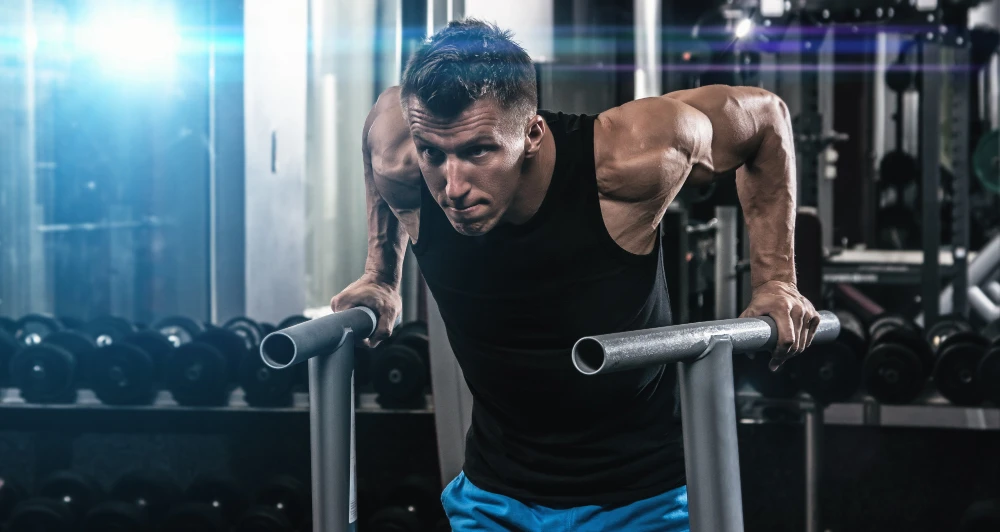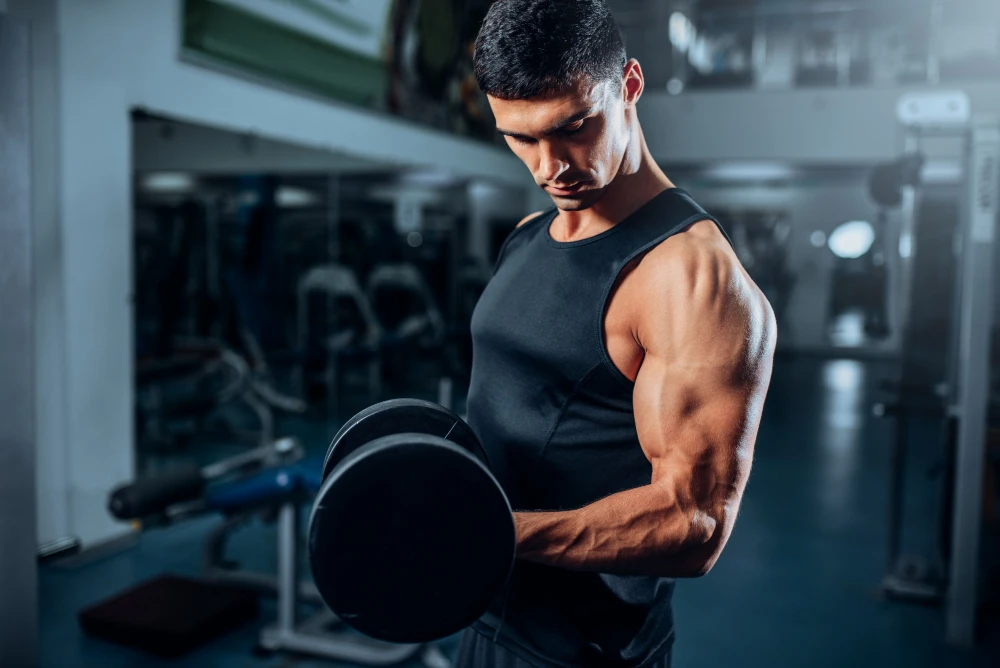Sports and Fitness require a wide range of skills to be successful. From hard skills like agility, strength, and coordination, to soft skills like teamwork, communication, and problem-solving. In this blog post, we will discuss the different types of skills involved in sports and fitness training. We will delve deeper into both hard and soft skills, their importance in sports and fitness, how to develop them and balance them for optimal performance. We will also cover the role of listening skills in sports and fitness as well as problem-solving skills. Lastly, we will talk about proficiency measurement and skill development strategies that can help you continuously improve your game.
So whether you are an athlete or a fitness enthusiast looking to up your game or seeking to build a career in sports coaching or training- this post is for you!
What are Different Skill Types in Bodybuilding?
There are four main skill types in bodybuilding:
- Muscular strength: This is the ability to exert a great force against a resistance. It is important for bodybuilding because it allows you to lift heavier weights, which leads to greater muscle growth.
- Muscular endurance: This is the ability to perform repeated muscle contractions against a resistance. It is important for bodybuilding because it allows you to train for longer periods of time, which also leads to greater muscle growth.
- Muscle hypertrophy: This is the increase in the size of muscle fibers. It is the main goal of bodybuilding, and it is achieved through a combination of muscular strength, muscular endurance, and proper nutrition.
- Bodybuilding posing: This is the art of presenting your physique in a competitive setting. It is important for bodybuilding because it allows you to show off your hard work and dedication to the judges.

Understanding Hard Skills in Bodybuilding Sport
Bodybuilding is a sport that requires a high level of both hard and soft skills. Hard skills are those that can be learned and measured, such as the ability to perform specific exercises with proper form. Soft skills are those that are more difficult to quantify, such as motivation, discipline, and mental toughness.
Some of the hard skills that are essential for success in bodybuilding include:
- Proper exercise technique: Bodybuilders need to be able to perform exercises with proper form in order to avoid injury and maximize muscle growth. This requires a good understanding of the anatomy of the muscles and how to target them with specific exercises.
- A high level of strength: Bodybuilders need to be able to lift heavy weights in order to stimulate muscle growth. This requires a combination of strength, power, and endurance.
- A good understanding of nutrition: Bodybuilders need to be able to eat a healthy diet that provides them with the nutrients they need to build muscle and recover from workouts. This requires a good understanding of macronutrients, micronutrients, and calories.
- A commitment to training: Bodybuilding is a demanding sport that requires a lot of hard work and dedication. Bodybuilders need to be willing to train consistently and intensely in order to see results.
Athletes require different skill types for sports and fitness training. Hard skills are those that can be measured and taught explicitly. Examples of hard skills in sports and fitness training include physical skills like strength, endurance, and flexibility; technical skills such as proficiency in executing specific movements smoothly; tactical skills involving decision-making during gameplay; and cognitive skills like problem-solving and strategic planning. These different skill types can be developed through regular practice and training.
How to Develop Hard Skills?
To enhance your Different Skill Types, you need to focus on three main types of skills: motor, perceptual, and cognitive. Enhance your motor skills by practicing specific movements related to the sport or activity; improve your perceptual abilities by anticipating opponents’ moves. Cognitive abilities can be sharpened through strategic planning during gameplay. Critical thinking and time management are other crucial skills that will help you excel in sports and fitness training. Teamwork and communication are vital soft skills that can help you work effectively with others.
Importance of Hard Skills in Sports and Fitness
Hard skills are the technical skills that are necessary to perform a job. In sports and fitness, hard skills include:
- Knowledge of anatomy and physiology: This knowledge is essential for understanding how the body works and how to safely and effectively train it.
- Knowledge of exercise science: This knowledge includes understanding the principles of exercise prescription, such as intensity, duration, and frequency.
- Skill in a particular sport or fitness activity: This skill can be developed through practice and training.
- Technical skills in coaching or instructing: This skill includes the ability to teach others how to perform exercises safely and effectively.
Hard skills are important in sports and fitness for a number of reasons. First, they allow individuals to perform at a high level. For example, a runner with a strong understanding of anatomy and physiology will be able to train more effectively and avoid injuries. Second, hard skills can help individuals achieve their fitness goals. For example, a personal trainer with knowledge of exercise science can help clients design a safe and effective workout program. Third, hard skills can lead to employment opportunities in the sports and fitness industry. For example, a fitness instructor with technical skills in teaching can find work at a gym or fitness studio.
In addition to hard skills, soft skills are also important in sports and fitness. Soft skills include communication, teamwork, and leadership. These skills are important for interacting with coaches, teammates, and clients.
Overall, hard skills are essential for success in sports and fitness. They allow individuals to perform at a high level, achieve their fitness goals, and find employment opportunities in the industry.
Here are some additional benefits of hard skills in sports and fitness:
- They can help you improve your performance.
- They can help you prevent injuries.
- They can help you learn new skills more quickly.
- They can help you stay motivated.
- They can help you achieve your fitness goals.
If you are interested in a career in sports or fitness, it is important to develop your hard skills. There are many resources available to help you do this, such as books, online courses, and personal training. With hard skills and soft skills, you can be successful in the sports and fitness industry.
What are Soft Skills in Bodybuilding?
Soft skills are the non-technical skills that are essential for success in any field, including bodybuilding. Some of the most important soft skills for bodybuilders include:
- Dedication and motivation: Bodybuilding is a long-term commitment that requires a lot of hard work and dedication. Bodybuilders need to be motivated to stick with their training even when they’re not seeing results immediately.
- Discipline: Bodybuilders need to be disciplined in their eating habits and their training regimen. They need to be able to follow a plan and stick to it, even when they’re tempted to cheat.
- Resilience: Bodybuilders will inevitably face setbacks, such as injuries or plateaus. They need to be resilient and able to bounce back from these setbacks.
- Communication: Bodybuilders often work with trainers, coaches, and other athletes. They need to be able to communicate effectively with these people in order to get the most out of their training.
- Teamwork: Bodybuilders may also compete in teams or participate in group training sessions. They need to be able to work well with others and be supportive of their teammates.
- Leadership: Some bodybuilders may choose to become trainers or coaches themselves. In these roles, they need to be able to lead and motivate others.
In addition to these soft skills, bodybuilders also need to have a strong work ethic and be willing to put in the hard work necessary to achieve their goals. With dedication, discipline, and resilience, bodybuilders can reach their full potential.
Interpersonal abilities such as communication, leadership, and adaptability are essential for success in sports and fitness training. Soft skills aid in building relationships and achieving objectives. Examples of these crucial skills include time management and teamwork. Developing one’s soft skills is a worthwhile investment that will improve overall performance.

Key Differences between Hard and Soft Skills
Effective sports coaching requires a balance of both hard and soft skills. While the former includes specific technical abilities like anatomy or biomechanics learned through education or training, the latter encompasses non-technical attributes like teamwork or motivation that hone through personal development. Achieving success in sports careers demands balancing both types of competencies. Building strong client relationships depends on developing effective coaching techniques with superior interpersonal communication by developing relevant job-specific skills.
Importance of Balancing Hard and Soft Skills
A balanced blend of hard and soft skills is critical for sports and fitness training success. Hard skills encompass technical abilities related to the sport or activity, while soft skills like communication, teamwork, motivation, and time management are personal attributes that contribute to success. Achieving a fine balance between these two types of skills is crucial.
Importance of Problem-Solving Skills in Sports and Fitness
To excel in sports or fitness training requires not just Different Skill Types but also strong problem-solving skills. Athletes and fitness enthusiasts need to analyze the problems they face and devise effective solutions. Problem-solving abilities can help strategize during competitions or find fresh ways to overcome plateaus while improving overall mental agility. Such critical thinking is invaluable in adapting to unexpected situations while also enhancing decision-making abilities.
How to Measure Proficiency in Sports and Fitness?
To measure proficiency in sports and fitness, one can use timing, accuracy, endurance, strength, agility. Skill development enhances proficiency in a specific sport or activity through motor, cognitive, perceptual or social skill building. Training programs must focus on balancing these skill sets for an overall sports/fitness proficiency level. Track progress with performance metrics to set achievable goals.
How to Continuously Develop Skills in Sports and Fitness?
To continuously develop skills in sports and fitness, consistency is key. Set specific goals and track progress to stay motivated. Incorporate a variety of drills/exercises along with seeking feedback from coaches/peers to identify areas for improvement. Take regular breaks for recovery as well. With these tips on skill development, you’ll be able to enhance your proficiency in sports/fitness while improving interpersonal skills such as teamwork, communication, problem-solving & critical thinking.
Let’s Sum Up
In conclusion, sports and fitness training require a combination of both hard and soft skills. It is important to develop both types of skills for optimum performance and success. While hard skills are essential in mastering specific techniques, soft skills like teamwork, communication, listening, problem-solving are equally important in achieving success in sports and fitness. Regularly assessing your proficiency level and continuously developing your skills will help you stay on top of your game.



